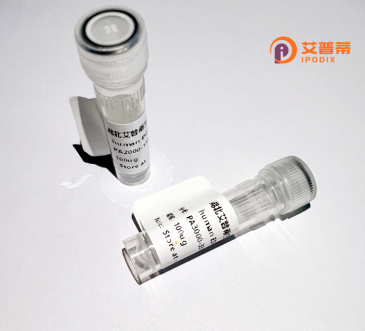
| 纯度 | >90%SDS-PAGE. |
| 种属 | Human |
| 靶点 | ZBTB7B |
| Uniprot No | O15156 |
| 内毒素 | < 0.01EU/μg |
| 表达宿主 | E.coli |
| 表达区间 | 1-539 aa |
| 活性数据 | MGSPEDDLIGIPFPDHSSELLSCLNEQRQLGHLCDLTIRTQGLEYRTHRAVLAACSHYFKKLFTEGGGGAVMGAGGSGTATGGAGAGVCELDFVGPEALGALLEFAYTATLTTSSANMPAVLQAARLLEIPCVIAACMEILQGSGLEAPSPDEDDCERARQYLEAFATATASGVPNGEDSPPQVPLPPPPPPPPRPVARRSRKPRKAFLQTKGARANHLVPEVPTVPAHPLTYEEEEVAGRVGSSGGSGPGDSYSPPTGTASPPEGPQSYEPYEGEEEEEELVYPPAYGLAQGGGPPLSPEELGSDEDAIDPDLMAYLSSLHQDNLAPGLDSQDKLVRKRRSQMPQECPVCHKIIHGAGKLPRHMRTHTGEKPFACEVCGVRFTRNDKLKIHMRKHTGERPYSCPHCPARFLHSYDLKNHMHLHTGDRPYECHLCHKAFAKEDHLQRHLKGQNCLEVRTRRRRKDDAPPHYPPPSTAAASPAGLDLSNGHLDTFRLSLARFWEQSAPTGPPVSTPGPPDDDEEEGAPTTPQAEGAMESS |
| 分子量 | 84.4 kDa |
| 蛋白标签 | GST-tag at N-terminal |
| 缓冲液 | PBS, pH7.4, containing 0.01% SKL, 1mM DTT, 5% Trehalose and Proclin300. |
| 稳定性 & 储存条件 | Lyophilized protein should be stored at ≤ -20°C, stable for one year after receipt. Reconstituted protein solution can be stored at 2-8°C for 2-7 days. Aliquots of reconstituted samples are stable at ≤ -20°C for 3 months. |
| 复溶 | Always centrifuge tubes before opening.Do not mix by vortex or pipetting. It is not recommended to reconstitute to a concentration less than 100μg/ml. Dissolve the lyophilized protein in distilled water. Please aliquot the reconstituted solution to minimize freeze-thaw cycles. |
以下是关于重组人ZBTB7B蛋白的3篇代表性文献概览:
---
1. **文献名称**: The role of ThPOK (ZBTB7B) in T cell development and differentiation
**作者**: Haxhinasto, S., et al.
**摘要**: 研究揭示了ZBTB7B(ThPOK)作为转录因子在调控T细胞命运中的核心作用,发现其通过抑制CD8+ T细胞分化并促进CD4+ T细胞的发育,影响免疫应答的方向性。
---
2. **文献名称**: ZBTB7B suppresses tumor progression by targeting HIF-1α signaling in colorectal cancer
**作者**: Rane, S., et al.
**摘要**: 本文发现ZBTB7B在结直肠癌中通过直接结合HIF-1α抑制肿瘤血管生成和转移,其低表达与患者预后不良相关,提示其作为抑癌基因的潜在临床价值。
---
3. **文献名称**: Structural basis of ZBTB7B zinc finger domain interaction with DNA
**作者**: He, Y., et al.
**摘要**: 通过X射线晶体学解析了ZBTB7B蛋白锌指结构域与靶DNA的复合物结构,阐明了其特异性识别DNA序列的分子机制,为设计靶向ZBTB7B的调控分子提供结构基础。
---
如需特定研究方向的扩展或全文获取,建议通过PubMed或Sci-Hub检索DOI/PMID。
ZBTB7B, also known as Th-POK or cKrox, is a member of the zinc finger and BTB domain-containing (ZBTB) protein family, characterized by its dual structural motifs: an N-terminal BTB (Bric-a-brac, Tramtrack, Broad Complex) domain and C-terminal zinc finger motifs. This nuclear protein functions primarily as a transcription regulator, modulating gene expression by binding to specific DNA sequences or interacting with other transcriptional machinery. It plays a pivotal role in immune system regulation, particularly in T-cell lineage commitment and differentiation. Studies highlight its critical involvement in promoting CD4+ T-cell development while suppressing CD8+ lineage differentiation, partly through antagonizing Runx3-mediated transcriptional programs.
Beyond immunity, ZBTB7B has context-dependent roles in cancer. It exhibits tumor-suppressive activities in certain cancers by repressing oncogenic pathways, yet acts as an oncogene in others by enhancing cell proliferation or metastasis. Dysregulation of ZBTB7B is linked to autoimmune diseases, metabolic disorders, and tumor progression. Its recombinant form, often produced in bacterial or mammalian expression systems, enables functional studies exploring molecular mechanisms and therapeutic potentials. Recent research focuses on its epigenetic regulatory functions, particularly through recruiting histone-modifying enzymes to alter chromatin accessibility. As a multifaceted regulator, ZBTB7B continues to be a key subject in understanding cellular differentiation and disease pathogenesis.
×